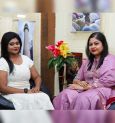Using headphones for a long time can harm your hearing. How do headphones damage your ears? What should you do to prevent ear damage? How can you take regular care of your ears? ENT specialist, Dr. Soutrik Kumar, provided special advice.
In a recent revelation by renowned otolaryngologist Dr. Soutrik Kumar, a critical discussion emerged on the proper care and maintenance of our ears. With prevalent misconceptions surrounding ear hygiene, it becomes imperative to dispel these fallacies and adopt effective practices for ear care.
Dr. Kumar emphasised the necessity of cleaning ears after showering, using specialised earbuds designed for this purpose. Contrary to popular belief, the ear possesses a self-cleaning mechanism, obviating the need for excessive intervention. However, if external debris accumulates, gentle cleaning with a damp cloth is recommended.
Furthermore, preserving ear health entails adhering to certain guidelines. Avoiding exposure to loud noises minimises the risk of trauma and subsequent damage to the delicate structures within the ear. Additionally, maintaining hygiene in the ear canal prevents the ingress of foreign particles and bacteria, safeguarding against infections.
The advent of technology has introduced new challenges, particularly with the widespread use of headphones. Dr. Kumar highlighted the detrimental effects of in-ear headphones, which can cause significant harm due to their proximity to the eardrum. Research indicates that these devices can amplify sound by 6–10 decibels, posing a substantial risk to hearing health. Semi-open headphones emerge as a preferable alternative for regular use.
Recognising signs of potential ear problems is paramount. Symptoms such as decreased hearing, discomfort, or unusual sensations warrant prompt medical attention to prevent complications. Moreover, excessive use of handheld devices exacerbates these risks, necessitating moderation and awareness of one's auditory habits.
In conclusion, prioritising ear care involves dispelling misconceptions and adopting evidence-based practices. By adhering to proper hygiene, mitigating exposure to harmful stimuli, and seeking timely medical assistance when needed, individuals can preserve their auditory well-being for years to come.
 বাংলায় পড়ুন
বাংলায় পড়ুন













